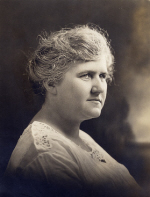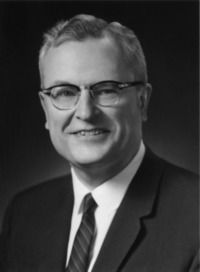Remembering Marquette Law School’s First Female Students
 During the past academic year Marquette University staged a year-long celebration marking the 100th anniversary of president James J. McCabe’s 1909 decision to open the doors of the university to women. In doing so, Marquette became the first Roman Catholic university in the world to admit women to its regular undergraduate program.
During the past academic year Marquette University staged a year-long celebration marking the 100th anniversary of president James J. McCabe’s 1909 decision to open the doors of the university to women. In doing so, Marquette became the first Roman Catholic university in the world to admit women to its regular undergraduate program.
However, when the first undergraduate females were admitted in 1909, women were already present on the Marquette campus, thanks to the co-educational policies of the university’s newly acquired law and medical schools.
Marquette acquired the previously private Milwaukee Medical College in 1907. At the time of the acquisition, the medical college already had six female students, as well as a non-degree-granting nursing program that was exclusively female. However, the Medical College classes remained in their own building, so the university’s primary academic building, Johnston Hall, remained an all-male preserve.
The gender integration of Johnston Hall came the following spring when the university completed negotiations to take over the independent Milwaukee Law School.
Women had a small but well-established presence at the Milwaukee Law School at the time of the merger. The school, which opened in 1893, had admitted female students as early as 1897, when 2 of 45 students were female. (Pre-1897 enrollment information is not available, and neither of the two students in 1897 were ever admitted to the bar.) However, from 1900 through 1904, all of the school’s students were male. In 1905, the school enrolled two female students and the number increased to three for the 1906 and 1907 academic years.
Marquette’s takeover of the Milwaukee Law School actually took place near the end of the 1907-1908 academic year. Once the merger agreement was signed, the students of the Milwaukee Law School left their downtown building and moved into Johnston Hall. Among the students making the trek were Katherine Williams, Leola Hirschmann, and Amalia L. Pryne—who together qualify as the first female law students at Marquette University. All three had begun taking classes at the Milwaukee Law School in the fall of 1905, and each was still enrolled in the spring of 1908.
Whether or not all three enrolled in the law school the following fall is unclear. The Report of the United States Commissioner of Education for 1908-09 reported three female students attending the school, but the Law School Bulletin published at the end of 1909 listed only Williams and Hirschmann, both of whom were enrolled in the evening division. Marquette now operated a law school with two divisions, and under the new arrangement the day division operated as a full-time university law school with classes held during the mornings.
Law degrees were awarded to students who completed the three-year curriculum with a certain level of academic performance. Students in the evening division continued with the curriculum of the Milwaukee Law School (which was less extensive than that of the day division) and were awarded law degrees once they passed the Wisconsin bar examination. (Before 1934, the diploma privilege applied only to the University of Wisconsin Law School.) Under this approach, 84 “retroactive” law degrees were awarded to former Milwaukee Law School students at the 1909 Commencement.
The First Female Graduates
The distinction of being the first woman to receive a law degree from Marquette University went to Katherine Williams who passed the Wisconsin bar examination in 1909, and in doing so became the 23rd female lawyer in the state’s history. The following spring, she was awarded an “honorary” law degree from Marquette on the basis of her completion of the evening law curriculum and her admission to the bar. She was also a featured speaker at the 1910 Marquette Commencement. Although the trio of Williams, Hirschmann, and Pryne had all completed their formal legal education by the end of the 1909 academic year, only Williams ever secured admission to the bar and thus was the only one of the three to receive a Marquette law degree.
How to classify the degrees awarded to those who had attended law school at night and then passed the Wisconsin bar examination was something of a problem in the early years of the law school and the “honorary” designation was one of several ways in which the degrees from the evening division were distinguished from those earned during the day. (Ultimately, a total of 144 “honorary” degrees were awarded.)
Williams had already earned a certain level of prominence as an educator before she was admitted to the bar. She had been teaching in the Milwaukee public schools for several years, and in 1908, she served as the Secretary of the Wisconsin Teachers Association.
After receiving her law degree Williams continued her career as a social activist and an educator. After her admission to the bar she served as president of the Milwaukee Teachers Association, and in 1912, she spoke at the annual meeting of the National Conference of Catholic Charities on the subject of “The Poor as Victims of Their More and Social Environment.” The program identified her as a member of the Board of Control of Wisconsin, chairman of the Committee of Civics and Philanthropy of the Marquette Women’s League, and a former member of the Milwaukee Tuberculosis Commission. She subsequently went on to a very prominent career in Wisconsin and Milwaukee where she practiced law for many years with the firm of Stem, Murphy & O’Brien.
Williams was a devout Roman Catholic and a devoted member of the Republican Party, and she was active with both institutions. She served as president of the Milwaukee Archdiocesan Council of Catholic Women from 1923 until 1941, and in 1926, she received two papal decorations from Pope Leo XIII. She also served as secretary of the Associate Republican State Central Committee. She was chosen to represent Wisconsin on the board of the International Union of Women Advocates in 1929, and in 1938, she was awarded an honorary doctorate in law degree by Mount Mary College. She died in 1942.
Unfortunately Leola Hirschmann and Amalia Pryne quickly dropped out of the accounts of the history of women in law in Milwaukee. When Williams died in 1942, the Wisconsin Bar Bulletin referred to her as the first female law student at Marquette (as did the university’s 2009 exhibit on the history of woman at the university). Nowhere was there any acknowledgement that she had female classmates. The two women also escaped the notice of the university’s historians. Both Father Hamilton and Thomas Jablonsky, the two preeminent historians of Marquette University, failed to note their status as the first female law students, as did law school historians Robert Boden and Michael Mazza.
Although Leola Hirschmann was never admitted to the Wisconsin bar, she went on to a distinguished career in public life. She became actively involved with the Milwaukee Woman’s Trade Union League, the Wisconsin League of Women voters, and the National Council of Jewish women, and in the 1920’s, she served a term as one of the regents of the University of Wisconsin. Her direct involvement with the legal profession was as a legal secretary, rather than a lawyer. She worked for many years for Milwaukee lawyer William B. Rubin, a prominent and sometimes controversial labor lawyer and socialist politician.
Much less is known about the subsequent career of Amalia Pryne. Pryne graduated from high school in Oshkosh in 1901, and as class prophet, she predicted that class valedictorian Mabel Currie would become a great woman lawyer and later attorney general. (Of course, it was she, not Currie, who later studied law.) She was never admitted to the bar in Wisconsin, and she died sometime before 1931 (when her estate was involved in an action to quiet title to a parcel of land in Oshkosh). It also appears that she relocated at some point to the Upper Peninsula of Michigan where she left part of her estate to establish a charitable trust bearing her name. As late as the 1960’s, newspapers in that part of Michigan contain references to a Amalia L. Pryne scholarship and the Amalia L. Payne Charity Trust.
The second female graduate of the law school was Marie Desrosiers, whose degree later turned out to be the subject of some controversy. Desrosiers began as an evening student in 1909—the year following the departure of the first three women—and she spent the next three years in the evening division. At some point after the 1911-12 academic year she “transferred” to the day division and received the LL.B. degree awarded to day students in 1914. The legitimacy of Desrosiers’ degree was one of the questions that Marquette had to address specifically when it defended itself before the AALS in 1916.
(In 1916, there was an effort to expel Marquette from the Association of American Law Schools, initiated by the University of Wisconsin, on the grounds that it admitted unqualified students as degree candidates and that it awarded degrees to those who were undeserving of such an honor. The charges were subsequently dropped.) In 1917, Ida Luick became the third woman to graduate from the Marquette Law School after completing most of her coursework in the evening division. Luick practiced in Milwaukee until 1970, specializing in probate matters.
The first female to receive a law degree from Marquette while attending classes exclusively in the day division was Geraldine McMullen, who graduated in 1920. (Until recently, her class photo hung in the hallway of the first floor of Sensenbrenner Hall.) McMullen practiced law in Milwaukee almost to the time of her death in 1984.
Of course, it has been a long time since female law students were a novelty at the Marquette Law School, although the appearance of women in large numbers is a more recent phenomenon than many realize. As late as 1967, only 8 of 260 Marquette law students were female, and it was not until the late 1970’s that the number of female students began to approach that of their male counterparts.


